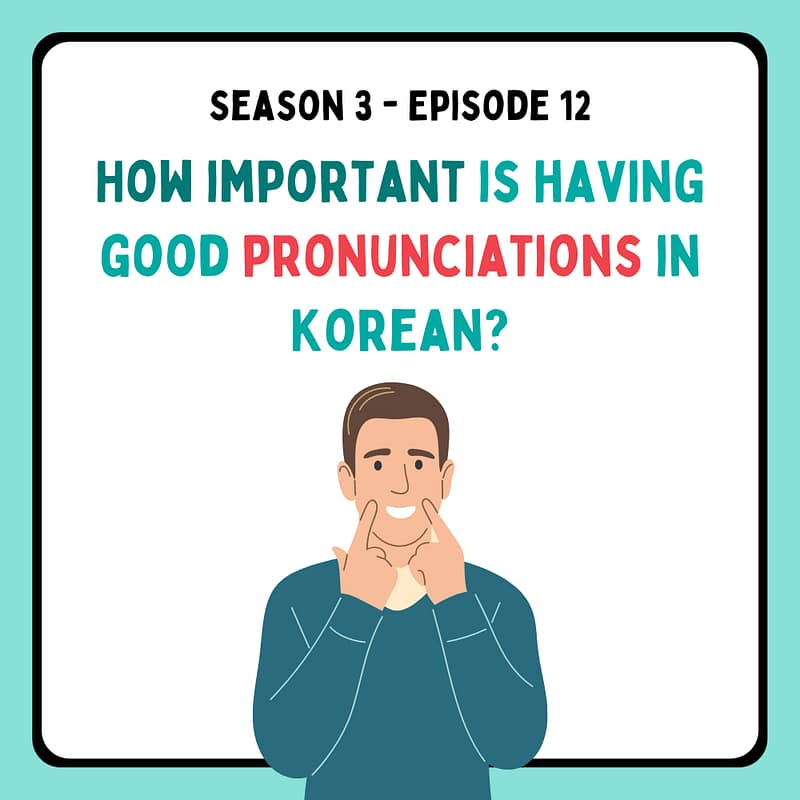Powered by RedCircle
안녕하세요? 잘 지냈어요? I’m your host, Vanessa, here at Korean Study Cafe Podcast.
Have you ever thought you want to be as fluent in Korean as your favorite actors or singers on Korean TV dramas or shows?
One of my students said during my class, who has the same concern.
I’ve learned Korean for about six months, and I feel like I’m stuck now. I don’t feel like my Korean is improving. Whenever you, the teacher, make me read Korean text out, I sometimes don’t want to do it because I don’t want to hear my poor Korean. I feel like my Korean sounds way far away from the native speaker’s pronunciation. It seems like I am not making progress because I feel this way. Could you please give me some advice for me?
Do you also have similar concerns or frustration while learning Korean? Then today, let’s talk about how to improve Korean pronunciation.
Before I get started, I just want to explain how Koreans don’t care about good pronunciation.
Unlike other countries, Koreans have lived for over 5,000 years as a one-ethnicity country, where immigrants and foreigners started to live in Korea over the last few decades. This background gives both pros and cons to all Korean learners or foreigners living in Korea today.
One of the pros is all Koreans treat foreigners like important guests. In Korean culture, guests should be treated preciously no matter what. Some Koreans obsessively think that they should provide them with better treatment, especially those interested in Korean culture and language. For this reason, most are likely to be willing to give you any help if you need it to learn Korean. In other words, I can guarantee that most Koreans would never laugh at the poor pronunciation nor treat you any differently. Koreans would rather think it’s impressive to see you trying to learn a new language because most of them know that learning a foreign language is sometimes a great pain and hardship. Most Koreans try to learn English from pre-kindergarten yet still struggle with it, so they know how difficult it is to learn a new language. This could provide you with great learning opportunities because you don’t have an emotional barrier to hesitate to try to speak.
Of course, there are some cons. Koreans tend to think that foreigners are guests, so they don’t see why some foreigners want to become a deeper part or integrate into Korean society. Some foreigners who have lived in Korea for a while may feel like there is a barrier to fully integrating into Korean society. It can take longer to permeate into the deeper part of Korean society as an immigrant or someone who wants to be treated as a native. In other words, you might feel frustrated by being treated as a permanent guest even if you understand Korean culture and society well. I will explain this part more in detail later if you want.
Anyway, this is why most Koreans don’t care about different or poor pronunciation. Also, we have a lot of dialects spoken in each province within Korea, of which there are nine provinces in Korea. Also, different dialects in other countries where Korean descendants live, such as North Korea, China, Japan, Central Asia such as Uzbekistan, Kazakhstan, etc. We don’t find any difficulty understanding them and don’t laugh at their pronunciation.
If you enjoy watching Korean TV shows, you may have noticed many celebrities who are foreigners. Most of them do not have Korean native pronunciation yet, they are still loved by Koreans regardless of their nationality. Plus, there are many Korean celebrities who have strong accents or dialects where their pronunciation isn’t great, yet people still understand and can communicate without an issue.
Even though Korea also has a social problem of racial discrimination like other countries, it is another story if you learn and speak Korean. All right, then, to improve Korean pronunciation, what shall we do?
This is what I did when I learned English and Spanish. I know my English is not perfect, but others still understand me and can communicate; the same goes for my Spanish. The first step is to avoid using English or your language romanization. No language can describe the other language’s pronunciation perfectly, especially with Latin-based language to Korean and vice-versa. At the initial stage of learning, it might seem very helpful and useful to copy the sound right away for beginners, but it eventually hinders you from going further. So try to get used to reading and understanding Korean romanization and phonetic symbols, even though it can be hard at first.
To make this process easy, try to read out Korean example sentences and dialogues as much as you can. When I was learning English and Spanish, I read aloud all sentences and dialogues while listening to the audio at least five times per chapter and reviewed the chapter repeatedly. I reviewed the same chapter the next day, a week later, and then when I finished one book again.
We, humans, the brain is designed to forget what we learned and practice once unless it is a critical circumstance such as an accident. If our brain could remember everything at once, our brain would have burned out by the age of 1 or 2. So we need to review it multiple times to grasp new knowledge.
I never met any genius who mastered a chapter after learning and practicing once while teaching Korean. Don’t be so harsh to yourself. It’s not just you. It’s all of us. Just try to review it multiple times. Patience, persistence, and perseverance are the keys to any success.
Also, I want to stress that you need to read aloud. By practicing aloud, you are using both your brain’s speaking and listening portion. Not only will it help you improve your pronunciation, but it will also help you memorize Korean words easily as your brain unconsciously starts to recognize Korean sentence structures.
Creating a foreign language sentence while following all the grammar rules based on new structures is unbelievably hard. So by reading out loud, you can maximize your input and get used to unique Korean language sentence patterns and structure relatively quickly and effortlessly. The process can seem tedious at first. But, you will clearly see how effective this practicing method is after a while.
In conclusion, I want you to have more confidence because Koreans don’t really care about your pronunciation. They would never ever laugh at you trying to learn Korean because they also know how hard learning a foreign language is, so they are mostly willing to help you. Also, to improve your pronunciation as well as Korean sentence creating ability, try to read out loud any example sentences or dialogues with audio that native speakers recorded. This will help you learn Korean so much faster and more efficiently.
Better yet, listen to our Podcast from our first episode and try to follow and repeat it out loud. The scripts are available on our website at Koreanstudycafe.com
All right, how was it? Does this ease your concern or frustration? I hope this helped to motivate you as you learn the Korean language.
If you have any questions or need any advice, please just send me DM through our Instagram “koreanstudycafe.official”





